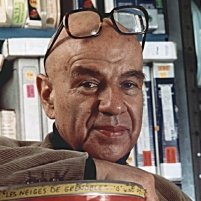
Olympic filmmaker Bud Greenspan died in New York City, at age 84, on December 25, 2010, with his partner and business associate, Nancy Beffa, by his side.
As the vice-president of the International Society of Olympic Historians, I had the honor of presenting Bud, during the Vancouver 2010 Winter Olympics, one of our awards, the Vikelas Plaque, for his contributions to Olympic History. As I said that day in Vancouver, it was I who felt honored to have the opportunity to express my appreciation to a man who inspired me by always emphasizing that for all the hoopla and marketing, sport is really about human beings trying to do their best.
Here is an updated version of the speech I gave that day.
Born in New York City September 18, 1926, Bud Greenspan covered the Olympic Games as a writer, radio broadcaster and filmmaker for more than six decades. His trademark was telling the intimate and often little-known story that is universally understood and appreciated. In the words of IOC President Jacques Rogge, Greenspan is“a master in the art of telling the story of the Olympic Games.”
In 1948, as the 21-year-old Sports Director of New York radio station WHN, Greenspan made his first Olympic "broadcast" from a pay telephone booth at Wembley stadium, the scene of the 1948 London Olympic Games. Four years later Greenspan wrote a story for Reader's Digest about U.S. weightlifter John Davis, “The Strongest Man in the World". Greenspan had met Davis at the Metropolitan Opera House in New York where Greenspan was a "spear carrier" amongst the extras and Davis, a baritone, was aspiring to become part of the Metropolitan Opera Chorus. Greenspan learned that Davis was not just a singer, but also the Olympic gold medal champion from 1948 and was going after his second gold medal in Helsinki in 1952. After his story was published, Greenspan followed Davis to Helsinki, resulting in production of his first film—the climax coming when Davis won his second gold medal.
Greenspan’s most monumental work was The Olympiad Series, which for the first time visually documented the history of the Olympic Games. First broadcast in 1976 as a 10-part series on the Public Broadcasting System in the United States, The Olympiad expanded to 22 one-hour shows and was aired in more than 80 countries around the world.
It took Bud Greenspan ten years; three million feet of rare, historic film; visits to more than 30 countries, and interviews with hundreds of past Olympic athletes to produce The Olympiad.
The Olympiad Series and the 1977 NBC movie-of-the-week film, Wilma, based on the life of sprinter Wilma Rudolph, paved the way for Greenspan’s next 30 years of documenting the Olympic Games. In 1984, despite having lost his beloved wife and partner in film, Cappy Petrash to cancer a year earlier, Greenspan and his company Cappy Productions produced the Official Film of the 1984 Los Angeles Summer Games, a 5-hour documentary titled: 16 Days of Glory–Los Angeles.
After 1984 he produced nine more Official Summer and Winter Olympic films including those for the 1988 Calgary Olympic Winter Games, the 1994 Lillehammer Games, the 1996 Atlanta Summer Games, the 1998 Nagano Games and those of Sydney 2000, Salt Lake City 2002, Athens 2004 and Torino 2006.
In addition to Official films, Greenspan produced more than 150 vignettes and retrospective films on the Olympic Games. For the 1996 Centennial, Greenspan was selected by the IOC to produce two films: 100 Years of Olympic Glory, a three-hour film exploring great international stories of the Olympic Games, and America's Greatest Olympians, a two-hour documentary that chronicled the inspiring stories of U.S. Olympic athletes. Others Olympic-themed films have included: The First Miracle, the story of the 1960 USA Hockey Team, Bud Greenspan Remembers: The 1972 Munich Olympic Games,Bud Greenspan’s Favorite Stories of Winter Olympic Glory and Bud Greenspan’s Favorite Stories of Summer Olympics. When the IOC opened its museum in Lausanne, Switzerland, Greenspan was commissioned to create a 36-monitor Multi-Screen visual and musical tribute to the Olympic Games titled The Spirit of the Olympics that is still on permanent display in the front hall.
Greenspan was also a writer for newspapers and magazines, contributing Olympic stories to The New York Times, The Los Angeles Times, Sports Illustrated, and Parade Magazine. He also published three Olympic books: Bud Greenspan’s 100 Greatest Moments in Olympic History (1995); Frozen In Time: Great Moments at the Winter Games (1997);and An Olympian’s Guide to Winning the Game of Life (1997), a compilation of great quotes from the hundreds of interviews he had conducted during his career. He was also the author of Play it Again, Bud! Sports History's Most Bizarre Blunders in Instant Replay (1973) and We Wuz Robbed! (1976).
For his films, Greenspan was honored with numerous awards including seven Emmys, the George Foster Peabody Award for Lifetime Achievement, the Directors Guild of America Lifetime Achievement Award, the International Fair Play Award, membership in the United States Olympic Hall of Fame and his proudest achievement, “The Olympic Order” that was presented to him in 1985 by former IOC President Juan Antonio Samaranch for his contribution to furthering the Olympic movement.
Greenspan’s dream was always to inspire future generations through his films. To help fulfill his dream, the United States Olympic Committee in 2007 endowed a scholarship in his honor at the USC School of Cinematic Arts.
Thank you, Bud.
-David Wallechinsky




